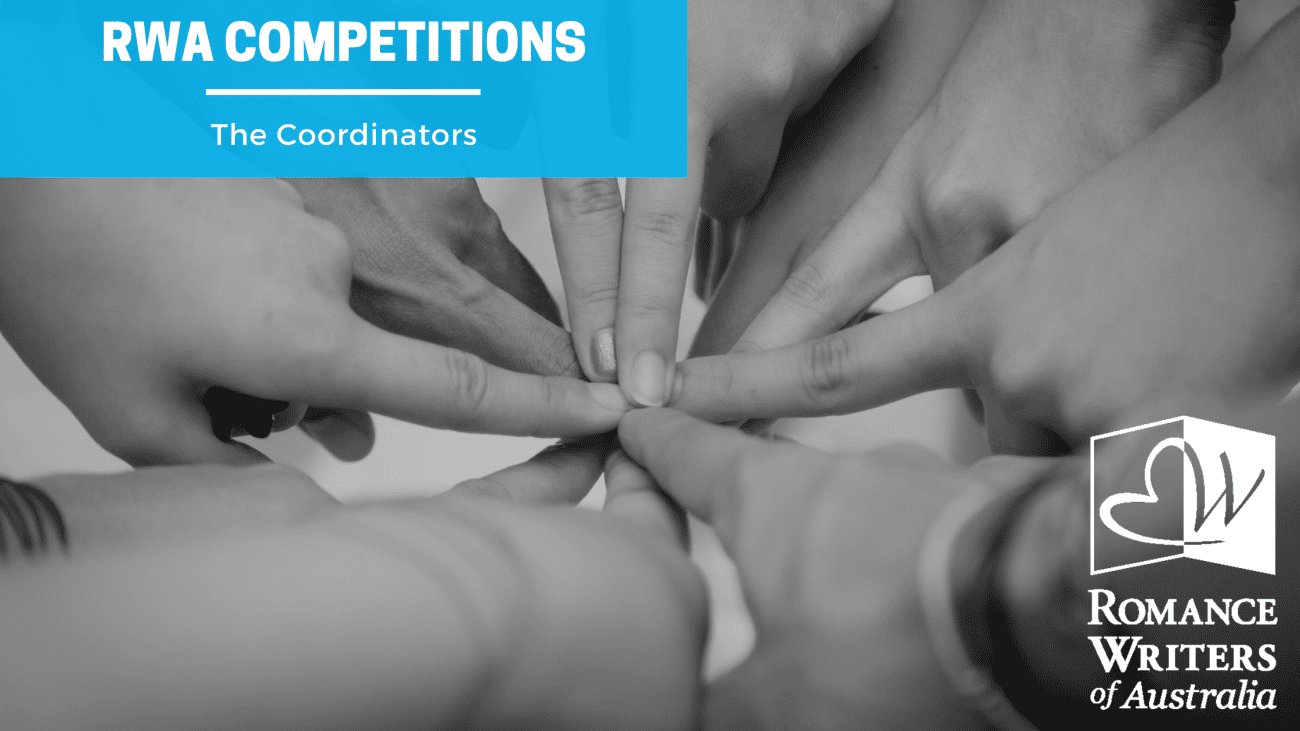The RWA (Romance Writers of Australia) run 9 competitions a year, from September to April. They cover a vast range of writing levels from the brand-new aspirer to the long-established author. Short pieces, long pieces, entire books, and publishing submissions are on offer to those that qualify. Mentorships, publishing contracts and two chances to appear in published Anthologies are just a few of the sought-after prizes.
So, I thought I’d find out about the coordinator and the humble competition.
Coordinator fun facts
16% of those surveyed were coordinators, both past and present. The Emerald competition had the most respondents at 4.
90% of coordinators familiarise themselves with Terms and Conditions prior to their competition starting.
88% said they read all or some of the entries received. 2% will read entries if there are discrepancies in judge scores.
53% agreed entries should come with trigger warnings.
What makes a coordinator and what do they love about the role?
Coordinators are patient people who love helping others on their writing journey. They are organised, quick responders, informative, helpful and all have PhDs in nagging. If they don’t, then they should.
They are a writer’s biggest cheer squad and love watching authors enter competitions year after year, gradually moving up scoresheet ladders. Some are even gamblers. Often, they will pick a story from the multitude of entries received and see if it will win.
What are some things coordinators dislike about the role?
Coming in at 98% was getting (nagging) judges to do their side. Many judges don’t answer emails while others don’t return scoresheets on time. Some judges pull out at the last minute and the scramble for replacements can be tough.
Second on the list at 76% were scoresheets. They can be time-consuming, and many felt were unwieldy.
If coordinators could make a change to competitions, what would they do?
100% of coordinators felt entries should not be professionally edited unless it is for the Ruby or Publishing Basics.
97% of coordinators said a common question asked was what genre a story fitted into. They felt providing a list of genres with brief descriptions to the entrant at the time of entering could be beneficial.
Have entrants mark their entries with heat levels so they can be matched appropriately with judges.
Introduce a dual timeline category.
A statement on the entry form saying: ‘Judge’s word is final.’
If you could make a change to your role as a coordinator, what would it be?
100% of coordinators requested a meeting between all coordinators and the competitions manager right after the conference and before the 1st competition starts. We can meet new coordinators, revise and/or bring up points of concern in the Terms and Conditions. Discuss any problems or changes while making sure everyone is on the same page.
92% of coordinators suggested The Emerald have two coordinators.
Bring in a judge coordinator. Someone who looks after the judges. They would recruit, keep lists of judges, the competitions they judge for, their genre preferences, heat levels etc. When a competition needs judges, the coordinator contacts the judge coordinator and requests a list citing how many judges they will need. If there’s a shortage, the judge coordinator puts the call out for more judges. The judge coordinator would also provide score ranking spreadsheets at the end of each competition to each Judge and any training.
What is the hardest thing in fulfilling a coordinator’s role?
98% said answering contestants’ questions when the answers are in the Terms and Conditions.
Seeing results that don’t reflect the best writers.
Having to tell the bottom entries they came last.
Do coordinators read all Scoresheets and check for accuracy and comment quality?
62% said yes. Some will send scoresheets back to judges if they feel comments are incomplete, ambiguous, or unnecessarily harsh. They also keep lists of judges whose comments they found to be unhelpful or if there were very few comments overall and report to the contest manager.
Has a coordinator’s writing been influenced through their role?
90% said no.
However, some said seeing the winning entries and comparing them to their own writings was insightful.
Is there a time in their role when a coordinator should put up their hand and ask for help?
Most definitely. 100% agreed we’re all in this together. The best thing about competitions is the mechanics are all the same so it’s easy for us to step into another coordinator’s role.
88% of respondents said we sometimes forget how important the competition we coordinate is and that others are depending on us. IE entrants and judges. So, if life gets in the way of volunteering, then speak up. It’s what we are here for.
Do coordinators like the current way of randomly selecting judges to read an entry?
100% said no. Judges are selected randomly through a formula and allocated an entry. This could be any combination of editors, published authors, unpublished writers, and avid readers of the genre.
Editors and published authors are hard markers. Unpublished writers are the most encouraging in remarks and middle of the road in their marking while avid readers of the genre give marks generously. If a piece of writing was allocated two avid reader judges and an unpublished writer judge they are going to do well even though their writing may not be of a high standard. And if a good piece of writing gets an editor and two published authors, the feedback will be fantastic, but the overall score will be low.
Coordinators would like to see one judge from each category allocated to each entry. This makes it fairer to all entrants and would most likely eliminate the dreaded third judge syndrome or the need for discrepancy judging.
Not every judge seems to get things right. As a coordinator, do you have any suggestions on how best to help them?
98% requested to bring back a judge’s test. A sample of work and Scoresheet for each new judge to complete. The coordinator then knows what type of judge they are getting and how much support and encouragement they will need. Again, this is something a judge coordinator could look after.
Do coordinators think some judges are better off judging some competitions more than others?
50% of respondents said yes.
The competition, Publishing Basics, is about assessing writing technique and whether it is good enough to go to a publisher or agent. Therefore, 93% of coordinators felt it should be judged by editors and published authors only.
If it’s a technical competition like Ripping Start and First Kiss, then we need more editor and published author judges in the mix.
46% of coordinators said it didn’t matter who judged what as it was up to the entrant on how they took the feedback.
Do we provide feedback on our judge’s scores?
67% of coordinators sent ranking scoresheets to their judges after the competition closed.
94% said judges were grateful to receive this and were reassured to know their marks weren’t too far off those of their peers. Some acknowledge their scoring is too low and ask for the entry to be given to someone else. While others chatted with coordinators on how best to improve going forward.
If you could say something to judges, what would it be?
Give lots and lots of feedback especially if you’re not rewarding top marks.
Thank You for your time!
What are the reasons why a coordinator will return work to an entrant?
Formatting and being over word counts.
28% of coordinators send a copy of formatting guidelines with the returned entry.
Do coordinators advise entrants when they can expect results?
83% said yes and will often go on to advise if there are any hiccups or delays in the competition process.
As a coordinator, what would you like to say to an Entrant?
Read the instructions. Be patient. Not everyone is going to love your writing like we do. Don’t take judges’ comments to heart just take what means something to you. Thank your judges. Don’t give up. Keep trying!

